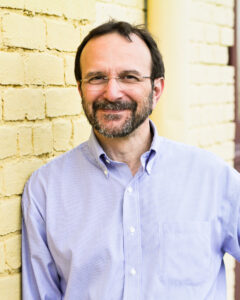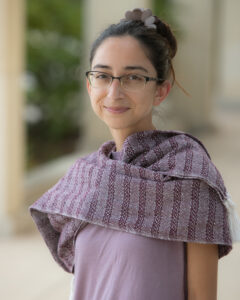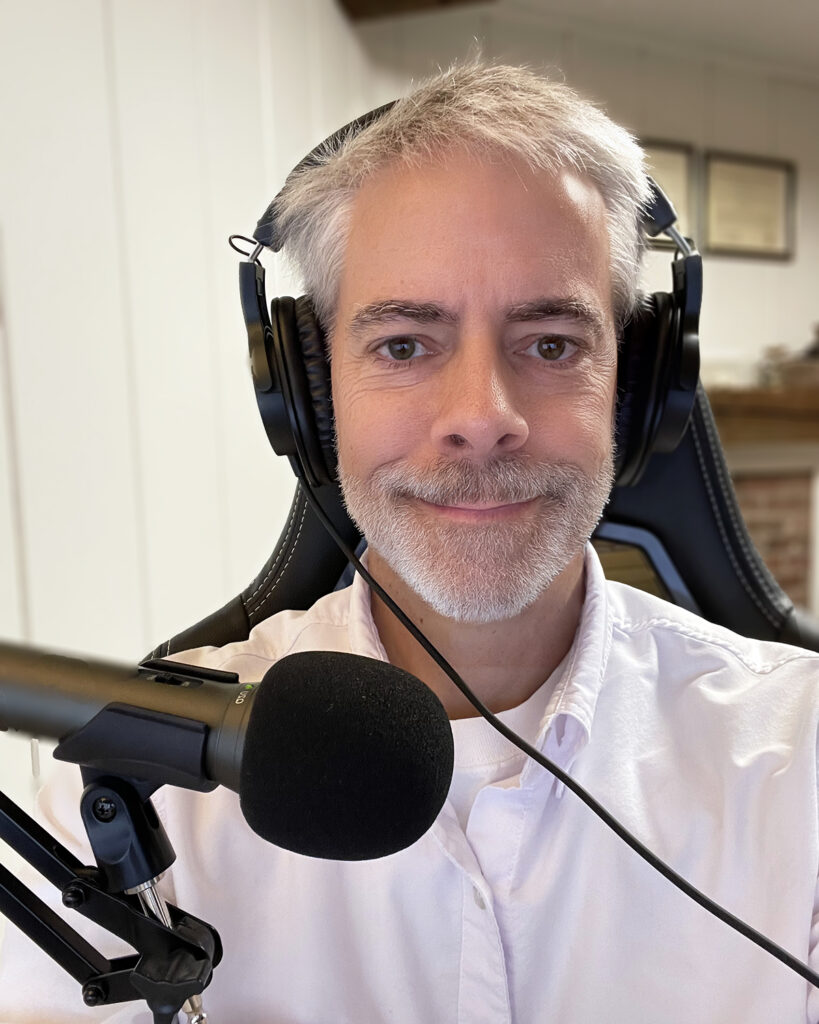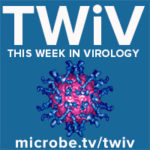This Week in Virology (TWiV) is a podcast about viruses. It began in September 2008 with Vincent Racaniello and Dickson Despommier, two Columbia University Medical Center science professors. Their goal was to have an informal yet informative conversation about viruses which would be accessible to everyone, no matter what their science background.
Why are we doing this? We have spent our entire academic careers directing research laboratories, so we have a lot of knowledge to share. Plus, we enjoy teaching. Put those two things together and you have TWiV. If you want to learn about viruses in a relaxing way, then TWiV is for you.
If you have any questions—we love them—send them to [email protected].
Please note that content in MicrobeTV podcasts should not be construed as medical advice.
The Hosts of TWiV
After reading about our hosts, consider the following excerpt from a review of TWiV on iTunes, written by Sparkly Twig, “… each virologist has a distinct personality (the Snarky Guy, the Sweet Wistful Guy, the Raconteur, the Sincere Guy).” See if you can figure out who’s who!
Vincent Racaniello, Ph.D.

Vincent is a Professor of Microbiology at Columbia University Medical Center. He has been studying viruses for over 30 years, starting in 1975, when he entered the Ph.D. program in Biomedical Sciences at Mt. Sinai School of Medicine of the City University of New York with a focus on influenza viruses …
Read Vincent’s full bio here.
@profvrr on X and Instagram
Brianne Barker, Ph.D.
Brianne Barker is an Associate Professor of Biology at Drew University. She grew up in Camden, New York, and was excited to try out research as an undergraduate. She was excited to move to a warmer climate and earned a BS in Biology from Duke University, where she also joined the laboratory of Barton Haynes and measured antibody responses to HIV vaccine candidates. She then earned a PhD in Immunology from Harvard University, where she worked with Norman Letvin examining cytokine control of CD8+ T cell memory. Brianne flew back south for a post-doc at UNC-Chapel Hill with Jenny Ting on innate immune responses.
Eventually, Brianne realized that she was drawn to a position at a liberal arts college teaching and running a lab with undergrads. At Drew, her lab focuses on innate immune DNA sensing. She teaches courses in immunology (lectures on YouTube), virology, microbiology, emerging infectious disease, and a study abroad public health course in South Africa.
She was a TWiV listener and then joined TWiV as a co-host in 2017 and Immune as a co-host in 2020 to further her interest in science communication and representing women in science. In her free time, she watches Duke basketball, does trivia, and cuddles with her cat, Athena.
bbarkerdrew.com: website | @BioProfBarker on X, Bluesky, Instagram, and Threads
Rich Condit, Ph.D.
Rich began his scientific career at age six when he had the good fortune to move to a property in Marin County, California with a creek running through the backyard. There he conducted an informal and largely unconscious multiyear study of the frog’s life cycle … until high school interrupted his investigations with more worldly pursuits.
Rich found his passion for laboratory science as an undergraduate at the University of California, Santa Cruz, studying the genetics of antibiotic resistance in bacteria and ribosome structure. Rich began studying viruses as a graduate student at Yale University, where he researched gene regulation during bacteriophage T7 infection, receiving a Ph.D. in 1975. As a postdoc at the Imperial Cancer Research Fund, in London, England from 1975 to 1977 under the mentorship of Robert Kamen, Rich studied transcriptional regulation of gene expression during infection by mouse polyomavirus, a DNA tumor virus. From 1977 to 1978 Rich undertook a second postdoctoral fellowship in the laboratories of Joseph Kates and William Bauer in the Microbiology Department at the State University of New York at Stony Brook, where he initiated his studies on the poxvirus vaccinia. Rich was an Assistant and Associate Professor of Biochemistry at the State University of New York at Buffalo from 1978 until 1990 when he moved to the University of Florida as a Professor in the Department of Molecular Genetics and Microbiology. Since 1977, Rich has used a genetic approach to study transcriptional regulation of viral gene expression and, more recently, virus assembly using vaccinia as a model system. Rich runs a relatively small research laboratory and still conducts his experiments In the laboratory and classroom whenever possible, He also teaches virology to graduate, medical, and undergraduate students. Rich plans to remain at the University of Florida for the remainder of his formal career when he can once again turn his curiosity to less formal pursuits. There’s a creek in his backyard…
Rich first appeared on TWiV as a guest on episode #26, “Poxviruses,” in March of 2009 and after several return visits became a regular participant in February of 2010. Rich feels strongly that science is for everyone and that an understanding of the scientific basis of our existence and an appreciation for the methods used to gain that understanding is critically important for the future of the globe. Rich is grateful that TWiV provides an opportunity to communicate this passion to a broad audience of listeners.
Alan Dove, Ph.D.
Alan Dove is a virologist, science journalist, collector of miscellaneous skills, and an all-around nerd. After obtaining a bachelor’s degree in biology from Towson State University in Maryland, he somehow got into Columbia University’s graduate program in microbiology and, even more surprisingly, got out with a PhD several years later. Having discovered that he was better at explaining science than doing it, he declared himself a science journalist in 1997, and people started paying him to write news stories about research. The checks are still clearing, so he hasn’t stopped yet.
Alan began co-hosting “This Week in Virology” in 2008. When not writing or podcasting, he pursues an excessively wide range of hobbies, from ham radio operating to video gaming to operating heavy machinery without adequate supervision. He lives in western Massachusetts with his wife, daughter, and three cats.
Daniel Griffin, MD, Ph.D. CTropMed CTH

A physician-scientist, board-certified in Internal Medicine and Infectious Disease with expertise in Global Health, Tropical Medicine, Parasitology, and Virology, including SARS-CoV2 (COVID-19). Chief of the Division of Infectious Diseases at Optum TriState and an Infectious Disease Physician at Columbia University. An active clinician and internationally invited speaker lecturing for multiple organizations, including the University of Glasgow, the Peace Corp, University of Minnesota, Foundation for International Medical Relief of Children (FIMRC), Floating Doctors, and Remote Care Education, as well as for other groups in Asia, the Caribbean, Central America, Africa, and India. One of the hosts of the popular podcasts This Week in Parasitism, This Week in Virology, and The IDPuscast. One of the authors of Parasitic Diseases, now in its 7th Edition with thousands of copies distributed to over 100 countries worldwide. His non-profit organization Parasites Without Borders shares office space with MicrobeTV.
Angela R. Mingarelli, DVM
Angela is a trained veterinarian and Ph.D. candidate in the Mandl Lab at McGill University in Montreal, Canada. Angela is originally from Ottawa, Canada where she spent most of her childhood outdoors exploring the forest with her 6 siblings and their 200 lb Newfoundland dog, Scotus.
Her childhood passion for animals led her to pursue a degree in veterinary medicine at the University of Las Palmas, Spain. Unexpectedly, during her training, her courses on infectious diseases sparked her interest. She was captivated by the immense diversity of immune systems across species while taking a second-year immunology course. She became more attracted to research and decided to pursue a Ph.D. in immunology instead of following the clinical track after completing her DVM.
Angela has been a fan of the MicrobeTV podcasts for years and showed a special interest in TWiV and science communication after meeting Vincent at the 3rd International Symposium on Infectious Diseases of Bats in the summer of 2022. Vincent mentioned the need for a veterinarian on TWiV—she seemed like a perfect match. Angela first appeared as a guest on TWiV #946, “Poo Versus Flu,” in October of 2022 and became a co-host in December 2022.
Angela loves anything aquatic in her free time, especially freediving and exploring nature with her dog, Odin.
Jolene Ramsey, Ph.D.

Jolene is an Assistant Professor and member of the Center for Phage Technology at Texas A&M University. She grew up in rural northern California but was nudged into science by multiple advisors at a small liberal arts college in Colorado. Her microbiology doctoral training with Tuli Mukhopadhyay at Indiana University focused on the structure and assembly of alphaviruses. Jolene returned to her first scientific love studying bacteriophages (phages), the viruses that infect and kill bacteria, as a postdoctoral researcher in Ry Young’s lab. In 2022, the Ramsey lab (ramseylab.vercel.app) opened at Texas A&M University to study the clever strategies phages use to manipulate their host cells, especially focusing on the escape process. In 2023, at Vincent’s invitation, Jolene added her voice to the TWiV podcast where she broadcasts the wonders and intricacies of phage biology to the diverse microbe.tv audience.
@jrrmicro on X and Instagram | @jrrmicro.bsky.social, Bluesky | @jrrmicrolab, YouTube
Kathy Spindler, Ph.D.
Kathy is a Professor of Microbiology and Immunology in the medical school at the University of Michigan. She became interested in science genetically: her parents were both chemists. Kathy had two inspiring science teachers in junior high school, and she always knew she wanted to major in biology, which she did at Purdue University. She moved to UC San Diego for her doctoral work and began working on viruses in her first rotation, with Dr. Masaki Hayashi.
She joined that lab for the first part of her dissertation research, working on the single-stranded DNA bacteriophage ΦX174. Kathy completed her Ph.D. in the laboratory of Dr. John Holland, working on “Evolution of viral RNA genomes in acute and persistent infections,” using vesicular stomatitis virus. In 1981 she began her postdoc with Dr. Arnie Berk at UCLA, focused on the human adenovirus proteins encoded by E1A.
Kathy moved to a faculty position at the University of Georgia (UGA) Department of Genetics in 1985, where she established studies of mouse adenovirus type 1 (MAV-1). This virus has similarities in molecular genetics with human adenoviruses, yet it can be studied in its natural host using the powerful genetic and immunological tools of the mouse model. At the end of 2001, Kathy moved to the University of Michigan, where her research into viral pathogenesis and host susceptibility to infection expanded. She has taught undergraduates and graduate students, both genetics and virology courses.
Kathy started her science outreach as a pen pal on science projects with elementary school children. She developed a summer genetics research program for visiting college students at UGA (SUNFIG). She is currently a member of the University of Michigan’s ADVANCE advisory board. ADVANCE began as an “NSF-funded project promoting institutional transformation concerning women faculty in science and engineering fields” and now, at Michigan, it has an expanded mission to promote diversity among faculty in all fields. Kathy served for five years on ADVANCE’s STRIDE committee, participating in workshops at the University of Michigan and around the country discussing practices to maximize the likelihood that diverse candidates will be identified, recruited, and promoted in the academy. She served for seven years as the Secretary-Treasurer of the American Society for Virology (ASV), directing the ASV Office at the University of Michigan and coordinating activities of the Society, including the annual ASV meetings attended by 1,500-2,000 people.
Guests of TWiV
Following is an alphabetical list of guests who have appeared on This Week in Virology.
- Chantal Abergel (TWiV 261)
- Mavis Agbandje-McKenna (TWiV 448)
- Raul Andino (TWiV 138 and TWiV 33)
- Katie Antony (TWiV 429)
- Andrew Baker (TWiV 102)
- Susan Baker (TWiV 276)
- David Baltimore (TWiV 100)
- Connor Bamford (TWiV 177, TWiV 183)
- Wendy Barclay (TWiV 177)
- Brianne Barker (TWiV 432, TWiV 456, TWiV 457)
- Ralph Baric (TWiV 364, TWiV 407 part two, TWiV 413)
- Dan Barouch (TWiV 244)
- Ashlee Bennett (TWiV 173, TWiV 268, TWiV 271)
- Stefano Bertuzzi (TWiV 438)
- Paul Bieniasz (TWiV 439)
- David Bloom (TWiV 111)
- Jason Botten (TWiV 240)
- Michael Bouchard (TWiV 80)
- Paulo Eduardo Brandão (TWiV 155)
- Thomas Briese (TWiV Special)
- Margo Brinton (TWiV 445)
- Jonathan Carlson (TWiV 390)
- Dominique Carter (TWiV 487)
- Roberto Cattaneo (TWiV 232)
- Mark Challberg (TWiV 203)
- Edward Chuong (TWiV 382)
- Jean-Michel Claverie (TWiV 261)
- John Coffin (TWiV 320, TWiV 510)
- Gary Cohen (TWiV 460)
- Kathleen Collins (TWiV 133)
- Sarah Connolly (TWiV 185)
- Karl-Klaus Conzelmann (TWiV 102)
- Ron Corley (TWiV 200)
- Lynda Coughlan (TWiV 452)
- Vanessa Cowton (TWiV 189)
- Carolyn Coyne (TWiV 193, TWiV 375)
- Susan Daniel (TWiV 436)
- Matthew Daugherty (TWiV 194)
- Eurico de Arruda Neto (TWiV 155)
- Jondavid deJong (TWiV 194)
- Kristina De Paris (TWiV 407 part two)
- Rosa Maria del Angel (TWiV 109)
- Joseph DeRisi (TWiV 196)
- Eric Delwart (TWiV 86)
- Terry Dermody (TWiV 226)
- Michael Diamond (TWiV 392, TWiV 414)
- Ted Diehl (TWiV 386, TWiV 415)
- Douglas Diekema (TWiV 496)
- Dirk Dittmer (TWiV 407 part one)
- Eric Donaldson (TWiV 90 and TWiV 28)
- Felix Drexler (TWiV 413)
- Jaquelin Dudley (TWiV 259)
- Paul Duprex (TWiV 200, TWiV 286, TWiV 413)
- Rebecca Dutch (TWiV 243)
- Katarina Eisenacher (TWiV 102)
- Nels Elde (TWiV 234, TWiV 382, TWiV 486)
- Richard Elliott (TWiV 177)
- Lynn Enquist (TWiV 54, TWiV 245)
- Michael Emerman (TWiV 237)
- Luis Enjuanes (TWiV 445)
- Jonathan Epstein (TWiV 501)
- Dave Evans (TWiV 235)
- Matt Evans (TWiV 20, TWiV 141 and TWiV 20)
- Anthony S. Fauci (TWiV 219)
- Stuart Firestein (TWiV Special, TWiV 385)
- S. Jane Flint (TWiV 245)
- Svetlana Folimonova (TWiV 503)
- Ron Fouchier (TWiV 177)
- Eric Freed (TWiV 37)
- Tom Friedrich (TWiV 260, TWiV 429)
- Matthew Frieman (TWiV 65, TWiV 75, TWiV 171, TWiV 175, TWiV 207, TWiV 204, TWiV 239, TWiV 258, TWiV 287)
- Mark Fuccio (TWiV 378, TWiV 412)
- Deborah Fuller (TWiV 121)
- Michaela Gack (TWiV 392)
- Michael Gale (TWiV 121 and TWiV 85)
- Thomas Gallagher (TWiV 276)
- Robert Garcea (TWiV 250)
- Erin Garcia (TWiV 455)
- Adolfo Garcia-Sastre (TWiV 74)
- Jason Gill (TWiV 502)
- Britt Glaunsinger (TWiV 228)
- Stephen Goff (TWiV 136 and TWiV 76)
- Tony Goldberg (TWiV 260)
- Sasha Gorbalenya (TWiV 497)
- Max Gottesman (TWiV 21)
- Nathalie Grandvaux (TWiV 499)
- Sid Grossberg (TWiV 487)
- Lorena Gutierrez (TWiV 109)
- Scott Hammer (TWiV 52)
- Hande Harmanci (TWiV 188)
- Eva Harris (TWiV 228)
- Reuben Harris (TWiV 232)
- Graham Hatfull (TWiV 87)
- Theodora Hatziioannou (TWiV 465)
- Frederick Hayden (TWiV 99)
- Mark Heise (TWiV 407 part two)
- Katya Heldwein (TWiV 464)
- Roger Hendrix (TWiV 135)
- Scott Hensley (TWiV 460, TWiV 480)
- Ya-Chi Ho (TWiV 510)
- Jim Hogle (TWiV 497)
- Mary Holton (TWiV 189)
- Stacy Horner (TWiV 498)
- Dennis Hruby (TWiV 270)
- Stephen Hughes (TWiV 510)
- Jon Huibregtse (TWiV 500)
- Shawn Iadonato (TWiV 121)
- Michael J. Imperiale (TWiV 182)
- Sharon Isern (TWiV 410)
- Ethan Jackson (TWiV 390)
- Welkin Johnson (TWiV 91, TWiV 122, TWiV 168, TWiV 218, TWiV 386)
- Tal Kafri (TWiV 407 part two)
- Esper Kallas (TWiV 383)
- Amit Kapoor (TWiV 137, TWiV 231)
- Andrew Karaba (TWiV 185)
- Stephanie Karst (TWiV 134)
- Michael Katze (TWiV 121)
- Rachel Katzenellenbogen (TWiV 135)
- Yoshi Kawaoka (TWiV 270)
- Karla Kierkegaard (TWiV 92)
- John Kirby (TWiV 487)
- David Knipe (TWiV 148)
- Eugene Koonin (TWiV 275)
- Marion Koopmans (TWiV 413)
- Laura Kramer (TWiV 392)
- Phillip Kranzusch (TWiV 148)
- Robert Krug (TWiV 255)
- Jens H. Kuhn (TWiV 283, TWiV 357, TWiV 508)
- Robert Lamb (TWiV 185)
- Helen Lazear (TWiV 194, TWiV 375, TWiV 407 part two)
- Stan Lemon (TWiV 235, TWiV 389)
- Judy Lieberman (TWiV 140)
- Aaron Lin (TWiV 415)
- Ian Lipkin (TWiV 137, TWiV 231,TWiV 247, TWiV Special, TWiV 384)
- Nathan Lets (TWiV 421)
- Carolina Lopez (TWiV 460)
- Jeremy Luban (TWiV 16, TWiV 11, TWiV 157, TWiV 375, TWiV 376, TWiV 409, TWiV 415)
- Harmit Malik (TWiV 205, TWiV 135)
- Lou Mansky (TWiV 232)
- Philip I. Marcus (TWiV 197)
- David Margolis (TWiV 407 part two)
- Nina Martin (TWiV 387)
- Jason McClellan (TWiV 500)
- Craig McCormick (TWiV 499)
- Sarah McDonald (TWiV 285)
- John MacLauchlan (TWiV 188)
- Myra McClure (TWiV 99)
- Grant McFadden (TWiV 124 and TWiV 84)
- Vineet Menacherry (TWiV 364)
- XJ Meng (TWiV 285)
- Scott Michael (TWiV 410)
- Nischay Mishra (TWiV 384)
- Seth Mnookin (TWiV 117)
- Emma Mohr (TWiV 429)
- Cary Moody (TWiV 407 part one)
- Pat Moore (TWiV 160)
- Nat Moorman (TWiV 407 part one)
- T. Jack Morris (TWiV 202)
- Stephen Morse (TWiV 34)
- Nissin Moussatche (TWiV 191)
- Elke Mühlberger (TWiV 200)
- Tuli Mukhopadhyay (TWiV 466)
- Vincent Munster (TWiV Special)
- Ed Niles (TWiV 120, TWiV 501)
- Ryan Noyce (TWiV 499)
- Andrew Noymer (TWiV 496)
- Kate O’Brien (TWiV 499)
- David O’Connor (TWiV 260, TWiV 429)
- Stefan Oliver (TWiV 194)
- Ray Ortega (TWiV Special)
- Julie Overbaugh (TWiV 143)
- Michelle Ozbun (TWiV 126)
- Cara Pager (TWiV 194)
- Mark Pallansch (TWiV 149)
- Massimo Palmarini (TWiV 188)
- Peter Palese (TWiV 102, TWiV Special, TWiV 396)
- Ann Palmenberg (TWiV 262, TWiV 497)
- Colin Parrish (TWiV 436)
- John Patton (TWiV 466)
- Marc Pelletier (TWiV 125, TWiV 115, TWiV 88, TWiV 67, and TWiV 31)
- Julie Pfeiffer (TWiV 286)
- David Price (TWiV 391)
- David Quammens (TWiV 408)
- Lan Quan (TWiV 231)
- Nancy Raab-Traub (TWiV 407 part one)
- Aidan Racaniello (TWiV 7)
- Gertrud Rey (TWiV 179, TWiV 424)
- Glenn Rall (TWiV 245, TWiV 277, TWiV 38)
- Alan Rein (TWiV 113)
- Tim Requarth (TWiV 442)
- Charles Rice (TWiV 392)
- Mark Robinson (TWiV 189)
- Jason Rodriguez (TWiV 50)
- Forest Rohwer (TWiV 391)
- Marilyn Roosinck (TWiV 92)
- Amy Rosenfeld (TWiV 468)
- Kate Rubins (TWiV 444)
- Stephen J. Russell (TWiV 395)
- Alfred Sacchetti (TWiV 132)
- Linda Saif (TWiV 445)
- Peter L. Salk (TWiV 281)
- Kirsten Sanford (TWiV 83)
- Erica Ollmann Saphire (TWiV 394)
- Peter Sarnow (TWiV 97)
- Sara Sawyer (TWiV 193)
- Leslie Schiff (TWiV 232)
- Michael Schmidt (TWiV 99)
- Stacey Schultz-Cherry (TWiV 143, TWiV 413, TWiV 496)
- Bert Semler (TWiV 97)
- Phillip A. Sharp (TWiV 462)
- Susan Sharp (TWiV 438)
- Tyler Sharp (TWiV 178)
- Tom Shenk (TWiV 234)
- Sabrina Sholts (TWiV 501)
- Saul Silverstein (TWiV 108, TWiV 27, TWiV 17, and TWiV 5)
- Anne Simon (TWiV 503)
- Ila Singh (TWiV 94)
- Ann Skalka (TWiV 245, TWiV 277)
- Derek Smith (TWiV 99)
- Greg Smith (TWiV 185, TWiV 378)
- Kathy Spindler (TWiV 172, TWiV 181, TWiV 190, TWiV 158)
- Ken Stapleford (TWiV 498)
- Ken Stedman (TWiV 195)
- Matt Stenglein (TWiV 196)
- Jinny Suh (TWiV 500)
- Lishan Su (TWiV 407 part one)
- Christopher Sullivan (TWiV 255)
- Matt Takata (TWiV 510)
- LJ Tan (TWiV 103)
- Vera Tarakanova (TWiV 487)
- Jeff Teigler (TWiV 244)
- Alice Telesnitsky (TWiV 158)
- Markus Thali (TWiV 240)
- Emma Thomson (TWiV 188)
- Brad Thompson (TWiV 131)
- Ben tenOever (TWiV 263)
- Scott Terhune (TWiV 487)
- Scott Tibbetts (TWiV 379)
- Trine Tsouderos (TWiV 149)
- Lorne Tyrrell (TWiV 235)
- David Tuller (TWiV 119, TWiV 397, TWiV Special, TWiV Special)
- Chris Upton (TWiV 22)
- Sandra Urdaneta-Hartmann (TWiV 489)
- Harold Varmus (TWiV 400)
- James Van Etten (TWiV 202, TWiV 261)
- Frank van Kuppeveld (TWiV 497)
- Gabriel Victora (TWiV 161, TWiV 157)
- Swetha Vijayakrishnan (TWiV 189)
- Luis Villarreal (TWiV 25)
- Michael Walsh (TWiV 169 and TWiV 173)
- Jennifer Webster-Cyriaque (TWiV 407 part one)
- Susan Weiss (TWiV 460)
- Sean Whelan (TWiV 464, TWiV 486)
- Gary Whittaker (TWiV 438)
- Gavin Wilkie (TWiV 189)
- Christiane Wobus (TWiV 243)
- Charles Wood (TWiV 202)
- Priscilla Yang (TWiV 148)
- Jon Yewdell (TWiV 208, TWiV 467)
- Ted Yewdell (TWiV 467)
- Hamish Young (TWiV 101, TWiV 36 and TWiV 30)
- Ry Young (TWiV 502)
- Julius S. Youngner (TWiV 373)
- Janice Reis Ciacci Zanella (TWiV 155)
- Carl Zimmer (TWiV 381)
- Francisco Murilo Zerbini (TWiV 155)
- Adam Zlotnick (TWiV 466)















Hi guys,
Just a quick one to say I love the show.
I'm a part time postgraduate student in biomedical science and have to say i found it really easy to absorb and entertaining.
I would really like if you could do a little section about Mumps as we are getting public health warnings here (Republic of Ireland) telling everyone to make sure they are vaccinated.
I got struck down with the virus when I was a student (despite being vaccinated) and have a special interest because of that. It's a nasty dose let me tell you! (far worse that the swelling in the neck was the 14 days waiting to be affected by the swelling in more sensitive masculine areas, there is a certain level of anxiety there 🙂 )
in case you are interested i have attached a link to the public announcements we are getting.
http://archives.tcm.ie/irishexaminer/2009/01/07…
(as an observation the figures they give are very short term since and it was a long time ago that I was vaccinated I'm not sure how meaningful they are. the majority of those affected are in their late teens so at a guess I would say that either there was a defective batch of vaccine, a new vaccine is administered now or there is a different strain of the virus. maybe I'm way off ill leave it to the experts 🙂 )
Regards,
Mark
I can not get enough of your podcasts, I am constantly on I-tunes looking for new ones.
Great podcast look forward to it every week.
As a practicing doc who learned most of his cellular chemistry back before you got your Ph.D.s , I'm not as up to date on the inner workings of nucleic acids. It would be helpful if you could do a show reviewing some of the more technical terms you guys use. Alternately, if you just gave a sentence explaining what the terms meant it would greatly help someone who thinks a “promoter segment” is someplace for the managers of professional boxers to hang out.
A few episodes back you mentioned that Chloroquin was found to inhibit a particular viral enzyme or protein that was found in some viruses including the Ebola family. Since the locations for Ebola and Malaria overlap, there must have been periods during Ebola outbreaks when humans were taking Chloroquin for malaria. It should be possible to look back and see if those individuals had a lower incidence of Ebola infection or lower death rates. Even if individual patients could not be identified, it might be possible to compare the size of Ebola outbreaks in areas with varying prevalences of malaria on the assumption that areas with higher malaria infections had higher numbers of humans taking Chloroquin.
Keep up the great work.
Thanks
Hello Gentlemen,
I work in IT but came across your podcast listening to the recent Futures In Biotech episode. I must say that I'm a HUGE fan now and am trying to catchup on episodes.
A few years go there was a lot of concern here in Toronto with West Nile virus. From a common person's person's perspective your podcast gave me the information I really needed to understand what was happening – far and away better than traditional media could provide.
You're going a great service. Please keep it up! 🙂 And I'll definitely recommend this to my friends and family. Thanks guys. 🙂
Ennio
Hi Ennio,
Thanks for your support. We were hoping that my appearance on FIB
would attract some of Marc Pelletier's listeners, and you are the
first we have heard from.
We have all intentions of continuing TWiV, bringing on new guests and
explaining virology to everyone.
Vincent
Thanks again for the show Doctor. I hope you don't mind, but I took the liberty of posting a review in the iTunes store (5 stars and it should be visible in the next few days I would think).
As for possible topics, is there any chance for segments of “Viruses for Dummies”? For example, I just listened to episode 8, with the of the person who had bone marrow transplanted and appears AIDS-free – but I don't understand how that would work…
Take care.
Ennio
Hi Professor,
finally caught up and TWIV will be a permanent resident on my IPod.
Thanks also for reading my message online.
Previously I mentioned 'viruses for dummies' and I think your entries on your blog are exactly what I was looking for. I think I can fill in missing blanks in my knowledge with a few books, articles, etc…
If I may mention a couple of podcasts and a blog for your consideration (none of which I'm involved with – I'm just a fan):
CBC Quirks and Quarks: http://www.cbc.ca/quirks/
Slacker Astronomy: http://www.slackerastronomy.org/wordpress/podcast/ (blog and podcast).
Thank you again for a great show! 🙂
Ennio
You just got another one of Marc's listerners! Awesome podcast. Now I see I've got a lot of work to do – 60 some odd episodes, huh? Wonderful!
Welcome, sciguy! Marc will be on TWiV in January 2010. He's terrific;
I like his podcast. Don't hesitate to join the discussion!
Can you display representation of your topics on a 'blackboard'?
Can you point me to an example of topics on a blackboard?
diagrams..for the older docs,such as myself
Hi Dr. Racaniello & Dr. Despommier:
Congratualtions for your great show. Although I have my MEng degree in Electrical Engineering and Computer Sciences, I have found deeply interesting your show. Although I have always liked biology, toxicology and of course virology, the concepts I have learned much much more about your field.
Two questions I would like to pass to you.
1) Can you cover in a future show the Human papillomavirus (HPV) and how it evolves into Cancer ?
2) Do you know where I can research a little bit about computer simulations, about the behavior of human viruses.
Thank you so much.
Leonardo Hernandez, BSEE, MEng, PEng.
Toronto, Ontario, Canada
Two comments.
I learn from your podcast.commuting to work on an interstate freeway in Michigan. Yes a few of us in Michigan are still employed. I can always plainly and clearly hear Vince and Alan. Dick is hard to hear. Is there something wrong with his mike? I could barely understand Saul. Please ask your sound team to help Dick and wonderful guests like Saul to be heard!
To answer a question posed in one of your podcats: When a newborn becomes infected during birth by a virus infected mother the route of transmission is called “vertical peri-natal transmission”. This occurs in infants born to women infected with hepatitis B virus with high viral load. Asian babies and toddlers acquire hepatitis B virus infected from their siblings and parents via “horizontal transission”.
Vince:
I used to be impressed with all your peer reviewed journal publications, but USA Today.
Wow, you can't get any more impressive than that.
Thank you. The writer of the USA Today articles, Dan Vergano, seems to
get it. He asked me the right questions and didn't over-hype the
story.
Dear Dr Racaniello and Dr Despommier ,
Excellent program , I am interested and more than not fascinated by viruses so your show is right up my ally. Thank you for your recent episode with Dr. Peter Palese , I have had my suspicions as to the magnitude and virulence of the Mexican Influenza and his explanation of variations in hemagglutiin and neuraminidase between different H1N1 strains was very helpful. As soon as the outbreaks occurred I checked your podcasts for new episodes , because I trust your coverage over the national inquirer type news media we have today. Please have more episodes covering the biology of different viruses , it is disappointing that we seem to focus on the diseases they cause, when an explanation concerning the virus itself sheds more light on the effects that it causes ie mexican influenza. Thanks again for your work and commitment to education and broadcast excellence
Sincerely from the South Carolina
Matthew
Hey,
I really like this show, I started on my Bsc. in Biotechnology and you guys are really giving me something to look forward to, when our courses are dull. I also heard about you through Futures in Biotech.
I have a quick question: I live in Denmark, so there's quite a lot of influenza and other throat viruses going around here, even though we have seasonality it's not uncommon to get flu (or something else) in the summer period. Despite this it's not normal to get vaccinated (only some elderly people) and I have never heard of anybody using tamiflu (although I'm sure it's used in immune incompetent patients).
But it sounds like it's quite normal to use in the US, can you explain this difference?
Greetings TWiV, I really enjoy listening to your podcast and find it quite enlightening, I am really interested in learning more about microorganisms, particularly viruses in general and have learned a lot from this podcast. I was wondering if you could consider making an episode focusing on Filoviruses. The reason why I am requesting this is because I just started reading a book that specifies in great detail about the Ebola and Marburg virus outbreaks in Africa and the adverse effects it has on human beings and monkeys. Also, I have two questions regarding the new strain of H1N1 Influenza virus you discussed in previous episodes and would appreciate your comments and feedback.
1. Does the RNA strand of H5N1 Avian Influenza in this new strain contribute to it's pathogenicity, if so why?
2 Also, does the RNA strand of Human Influenza virus in this subtype enable it to become more easily adaptable and transmissible between human beings?
P.S. Perhaps you should create an episode about computer viruses, haha. Great podcast, keep it up and I'll make sure I'll recommend this to anyone interested in Virology.
Hello,
My hustand told me about your show a while ago and since then I've been listening to it every week. Neither my husbad nor I are scientists but we love it. I have a question which may sound very basic but I have been wondering about it for a while. Can one become negatively effected by being vaccinated against to many things? I refer to the situation nowadays when there are vaccinations not just against the core deadly viruses (polio etc) but against stomach bug viruses, flu etc. Many thanks. Danica
Could you include a segment of basic virology with each episode? I much enjoy the show. Thanks for your efforts.
Great show! I would like to hear you interview Perry Bates who intevented the only stand alone machine that kills airborne pathagons, not just mold, and would fit in well with most of your topics. He would love to do and interview, and I can get you in touch. You can check out more info at http://www.mold-sentry.com. Here is an interview he did with Denny Schaffer on his morning radio show: http://www.drop.io/moldsentry. Keep up the great work.
Since my undergraduate degree (4.5 years ago), I have worked as a virology lab technician (on Buggy Creek Virus). I love the podcast and am considering graduate school in virology, and your podcast has given me much information and many ideas! You have talked about bringing in younger guests, and I like this idea, but would prefer a graduate student who is familiar with virology, but not as versed as you. Mainly, I am writing to suggest bringing more women on the show! I am slowly listening to old episodes, while keeping up with new ones, and notice a lack of female voices. I think it would be great if you could bring in young, female virologist that may encourage the current and up-and-coming female scientist. Thank you for your time and all the great topics on viruses!
Vince & Dick,
On a recent trip to North Carolina a friend at Med School gave me podcast 1 about West Nile. Fantastic episode. I have since downloaded the whole back catalogue and can't wait to listen to them when i go back to Tanzania to continue my PhD in the control of malaria mosquitoes. I will be sure to pass the episodes on to my friends & colleagues who, I'm sure, will love the show.
It would be great if you could do a show on Rift Valley Fever. There was an outbreak last year in Dodoma, Tanzania that resulted in a lot of people stopping eating beef. Especially interesting with the vector side of things. Would be very interested to hear your & Dick's take on this.
Keep up the great work chaps!
Oh, & try and keep the humour in the show. The more lame virus jokes/anecdotes the better.
Hello Professor Racaniello,
First I want to say that I love your podcast! I’m fascinated by the topic and may have majored in virology if I was exposed to this material earlier in life. I am a Chemistry major and have worked in the Semiconductor manufacturing field for more than 20 years building integrated circuits and now work for a small company in Monroe, Washington making state-of-the-art compact high-powered solid state laser systems.
I’m glad you’ve decided to devout part of the show to basic virology (so called Virology 101.) Although I understand most of the material on the show, some of the common virology terms used by you and Dick are foreign to me. In future virology primers it would be helpful to define and explain some of the more common virology terms commonly in the field of virology, which may not be so common to us lay people.
For instance, I’ve heard the term negative-strand RNA mentioned a few times on the podcast. It would be nice to explain exactly would a negative-strand RNA virus is and how it works. I googled the term but the definition I found online is fuzzy. The negative strand virus was explained as the antisense-strand of RNA which does not encode for mRNA (mRNA encodes proteins.) What does the antisense-strand of RNA encode for and how does it work?
Here is one more last item. I will post a link to a suppressed 60-minute episode back from 1977-1978 which covered a Swine Flu vaccination campaign that seemed to go wrong. I’d really like to hear your perspective on this 60-minute episode.
http://tinyurl.com/mtv4gb
Thanks much,
Gus
PS: Does Dick have a Twitter account? I follow both you and Alan on Twitter but haven’t been able to find Dick’s account (if he has one.)
I love the podcast, I am a doctor of pharmacy and I find the information to be very interesting and informative. I would love to hear something about the JC virus, recently I saw a case where this virus was suspected. Thank you
Chris
Boston
Greetings.
I just wanted to send all of you some well deserved kudos for your superb presentation of Twiv: the engaging and informative weekly podcast on the world of viruses. (The kind that make you sick of course)
Your banter is fun but not over the top and while you don't pull any intellectual punches with your use of nomenclature, you're explanations are thorough enough so that laymen like me are able to come along for the ride.
Two viruses I'd like to hear more about are Viral hemorrhagic fever (that sounds like a really nasty one) and Rift valley fever.
Thanks again and keep up the great work!
Matt
Great program!
I love the show and currently do some undergrad research in virology and it has captured my interest. I am applying to graduate school and have attended some fairs, but I am still struggling to find a program that is right for me.
I wanted your opinion on schools that had good virology or microbiology/immunology PhD programs.
I know this is a broad question but I figured someone with your experience could point me in the right direction.
Thanks!
Blake
I'm still working my way through your fantastic podcasts. Kudos on making virology simple and entertaining enough to capture the interest of the non-virologist.
In show 29, you mentioned two theories of viral evolution: most primitive form of life or devolved form of life. I have to disagree with both theories. A third (and to my mind, more likely) theory, is that viruses evolved from horizontal gene transfer pathways. As HGT evolved, defense must have developed as well as counter-transfers. I propose that some of these counter-transfer strategies evolved into weaponized inter-bacterium “modules” which, in turn, were better weaponized by adding self-replication genes to the mix (not unlike the evolution of computer viruses). Thus viruses evolved as sub-units of (archae)bacteria and took on a “life” of there own.
That brings up the topic of the definition of life. I would propose that life could probably be defined as a self-replicating “process” that generates a repetative, localized decrease in entropy. This definition should, I believe, eliminate candles, stars, and most enzymes as forms of life but would allow viruses to be considered borderline life forms.
Thanks for the great podcast.
My wife and I have 12 grand children. Most of my family was home for Thanksgiving and one evening we got into a discussion about chickenpox vaccinations. A couple of the parents stated that they had heard that the chickenpox vaccination may do MORE harm than good. Their opinion was that it was best to actually get the virus as a young child.
Everyone agreed that any ADULT who had never had chicken pox or been vaccinated, should be vaccinated. Could you shed some light on this subject?
Hello Dr Racaniello,
i was listening to your podcast last week on the new “poxvirus” found in the squirrels of Europe (both red and grey) and the comment was made that rabbits are rodents, you were talking about the rapid breeding rates of rabbits and to the myxomatosis virus outbreak in Australia. I thought i should correct the group that rabbits are not rodents, but are in fact from the Order lagomorpha Family Leporidae. However, squirrels are rodents, Order Rodentia Family Sciuridae. Just keeping you honest, love the podcast
Matt
Thanks for picking that up, Matt. Alan writes: “My bad. The rabbits
were once considered rodents, but they were reclassified into a
separate order several decades ago. We can make amends on the next
episode.”
PencilThings.com is selling a pencil which says:
It's Pointless to Panic About the Flu,
Wash Your Hands Frequently and Thoroughly. Stay at Home If You Are Sick.
Avoid Touching Your Eyes, Nose and Mouth. Get a Flu Shot.
Cover Your Nose and Mouth When Coughing and Sneezing.
Avoid Close Contact (6 feet) With Sick Persons
It could be a fun little gift
Here's the link for the pencil:
http://www.pencilthings.com/product.php?product…
PencilThings.com is selling a pencil which says:
It's Pointless to Panic About the Flu,
Wash Your Hands Frequently and Thoroughly. Stay at Home If You Are Sick.
Avoid Touching Your Eyes, Nose and Mouth. Get a Flu Shot.
Cover Your Nose and Mouth When Coughing and Sneezing.
Avoid Close Contact (6 feet) With Sick Persons
It could be a fun little gift
Here's the link for the pencil:
http://www.pencilthings.com/product.php?product…
Gentlemen:
I'm looking forward to the “This month in parasitology” podcast. I have not found the link on your site. Perhaps you haven't started on this yet? I'm keen to listen.
Best regards,
Rufus Knapp
You can find “This Week in Parasitism” at microbeworld.org/twip.
Dear Drs Vince and Dick,
I have come late to your show, and have been listening for only a month now. This a wonderful podcast, and I just finished episode 2o.
I look forward to 21- …
In episode 20, when you were discussing why Aedes egypti only needed one blood meal, but they would go for more, my first thought was that the malarial parasite might be controlling this behaviour. Make the little #$%# go back for more, even though she didn't need to.
I'm sure you have come back to this question, but I had to commment. Now I have to race through all the episodes to find out if my question has been answered!
thank you for your great podcast.
paul barry
Dear Vincent Racaniello,
I love your TWiV netcasts. They are perfect for my busy lifestyle. I listen while doing dishes, cycling to work and working at my lab-bench. My first degree was in Biochemistry and Molecular Biology, then I worked in Immunology for a couple of years before beginning my PhD in Influenza with Wendy Barclay (in Geoff Smith's Section of Virology in London).
Having not enjoyed a formal education in Virology, the netcasts give me a chance to fill the gaps in my knowledge as well as keep up to date on new important discoveries. There is just not enough time to read as much as I would like to: It's hard enough staying on top of the flu literature!!!
I love Virology, but miss Immunology. Can you try to convince one of your colleagues from the Immunology side of your department to start up TWiI???
I would be forever great-full.
Cheers,
Deena
Once upon a time bacteria discovered a mechanism they could use to backup their genome data in solid state external devices called phages. This had obvious survival value. Silly scientists discovered these data stores and thought they were organisms so they tried to classify them and work out their genomes. After a while they discovered that the so called independent genomes for each of the phage “families” were just components in the bacteria's massively distributed datastore. Trying to store all the genomes for all the organisms in the world soon brought them to the realisation that bacteria were very wise indeed and that they had better just let organisms store their own genomes for us to sample when needed rather than trying to fill the world with human created hard drives. ;-}.
Rick Swancott.
Also a grad of State University at Stony Brook NY…
Great podcasts you have, I thank all of you for taking the time to do this, keep up the great work; You are all a great inspiration!
Dear Drs. Despommier and Racaniello,
Thank you so much for these wonderful podcasts and lectures. I’m just finishing an MPH at Johns Hopkins and am in the process of choosing and applying to PhD programs. If one should follow their passion, as I have heard one should when going for a PhD, I would apply to Molecular Microbiology programs. I have a solid liberal artsy type academic background (pre-Hopkins MPH) with several master’s degrees in non-science fields. But I’ve never taken lab coursework, nor have I worked in the lab side of laboratories (I have worked in the public health side of a public health laboratory). Anyway, I discovered these podcasts about a month ago. They kept me company on a cross-country drive, and, now, I simply can’t get enough of TWIV and TWIP! I listen in the car on the way to work, while at the gym, and while cooking dinner. I’ve also starting going through Dr. Racaniello’s Virology lectures. Loving these! So, given that I like this so much but don’t have a lab background, do you think it is within reason to apply to microbiology-type PhD programs? If so, any suggestions?
Thank you!
Charleen
luv ur show,i am a layperson with some science bckgrd and understand most of ur verbage.u guys are a respite from the usual bs world and a great way 2 fall asleep @ nite,thanks
lol, your traffic and weather updates put this guy to sleep.
Mission accomplished!
Kathy Spindler is a nice addition to the group. Like her picks of the week.
Mike
Hello TWIV hosts,
You guys are helping to make many Eklavyas (http://en.wikipedia.org/wiki/Ekalavya), which is good for the betterment of the world. Keep up the good work!
TWiV mentors, Congratulations to Dickson Despommier for making the cover of the Wall Street Journal discussion of vertical farms. Unfortunately, his affiliation(s) only indicated a microbiologist at Columbia University and not his claim to fame, as we know him, as a Founding TWiVer. Keep up the great podcasts (all of them). My long bike rides are scheduled around how many TWiV, TWiM and TWiP podcast have been downloaded. Jim Polisini, Senior Toxicologist
Dickson answers: Many thanks!!!
The discovery of prions, it means that the DNA is the genetic material of the end times idea?
? prions are maliciously bonded proteins….so there wouldn’t be DNA…..wait what
Prions do not contain DNA. However, prions are proteins and they are encoded in the DNA of the organism. So the existence of prions does in no way refute the idea that DNA is the genetic material.
I believe that STS 107 is the source of the future genetic bomb of the apocalypse. The internal combustion engine and ruminants play a role. Fortunately , an antidote is predicted to be simple.
Thank you so much for the great work and your enthusiasm! Lots of junior scientists here enjoy your podcasts! Keep on doing it! Greetings from Germany. Susanne
Dear Twiv,
You guys are my favorite podcast! I look forward to it every week.
I’m an electrical engineer by training and real-world occupation, but I really enjoy learning about viruses. I really appreciate that you do not dumb down your talk.
I saw an article recently that said there is the potential to create a vaccine that would eliminate all new flu viruses. If this would happen, could something worse than the current flu virus take its place?
Here’s the article:
http://www.independent.co.uk/news/science/scientists-discover-blue-print-for-revolutionary-universal-flu-vaccine-8832988.html
regards, bernardo
Can’t thank you all enough for doing what you do. Fascinating stuff, all round. What an amazing world it is.
I work full time and lead a pretty active life, I like to listen to podcasts to see what’s going on in the various sciences that I am interested in. I had high hopes for your podcast but was very disappointed by lengthy discussions about weather and traffic. When searching for your web site to write this I found this in google, “Their goal was to have an informal yet informative conversation .” I think you’ve gone overboard on the “informal”, I would like to request that you spend, oh, I don’t know, maybe ZERO time on traffic and weather and anything not directly related to virus news, and launch directly into the discussion. Or if you want to waste a lot of time talking about weather, traffic, laundry, your favorite tv shows, etc. waste your time not ours, cut that junk out of the show so we hear the actual virology, not your pathetically boring conversation.
Dear TWiV hosts,
I am a PhD student and am working with West Nile Virus. My masters is in Marine Ecology – I worked specifically with seagrass pathogens. I kind of fell in love with host-pathogen ecology and evolution, but was interested in doing research that was more directly connected to public health, so I decided to focus my PhD on vector-borne diseases. I really enjoy your podcast: I’ve learned a lot not only about virology, but about the process of doing research, which is frustrating and imperfect most of the time. I definitely feel like I have cultivated a lot of obsessive persistence.
Recently I’ve been dealing with some contamination issues in our cell lines. I’ve lost about 3 months of work but have stumbled upon little nuggets of information about why I might be having problems.
To give you a little background, 3 of the 4 labs in which I’ve done cell culture work use antibiotics and antimycotics. The only labs in which I’ve noticed fungal and/or bacterial contamination have been the labs that use antimycotics (pen/strep) and antibiotics (amphotericin).
I think that in all 4 labs, proper aseptic techniques are adhered to. I think that the problem is that we’ve started selecting for resistant strains of fungi and bacteria.
I’m wondering if you guys have considered doing an episode (or series) – on recent issues with contamination (including HeLa cell contamination). It might seem boring at first, but speaking from the benches (aka trenches), I feel like I’d be at the edge of my seat, and I wouldn’t be the only one. I have no idea how this might affect our inference. Sometimes this contamination is cryptic. It pops up when I do plaque assays, where I’m using 2x media, but not when I look (extensively and obsessively) at my cells under the microscope. I’m working with Vero cells.
A lot of the literature out there about contamination seems to be published by product manufacturers, and is inconclusive, not quantitative, vague, and, well, uninformative.
Maybe there’s a useful discussion forum or blog?
I figured I would ask you if you’d consider a discussion about this. I am hoping that I am not the first to ask ! 🙂 Fingers crossed.
If nothing else, it might be interesting to hear contamination stories from our colleagues.
Sincerely,
Gabriela
How do i get access to all of your previous podcast.. i am looking at what you have on iTunes but its only showing 100 episodes. Im looking for the earlier podcast before the last 100 that you have on there. Please help!
Hi Professors and distinguished comrades,
I just found your podcast today, and I love it. I work in public health and also have been volunteering with COVID-19 testing amd vaccination drives. Especially with health outreach, I’m encountering a lot of concerns about the COVID-19 vaccines from African-Americans and people of color. Do you feature any virologists who are also people of color? Are there any particular episodes that address the concerns of these groups that I can point them to? I’m searching but you have such a wonderful library it’s difficult to find so far. Thank you so much for all of your research, efforts, and excellent information!